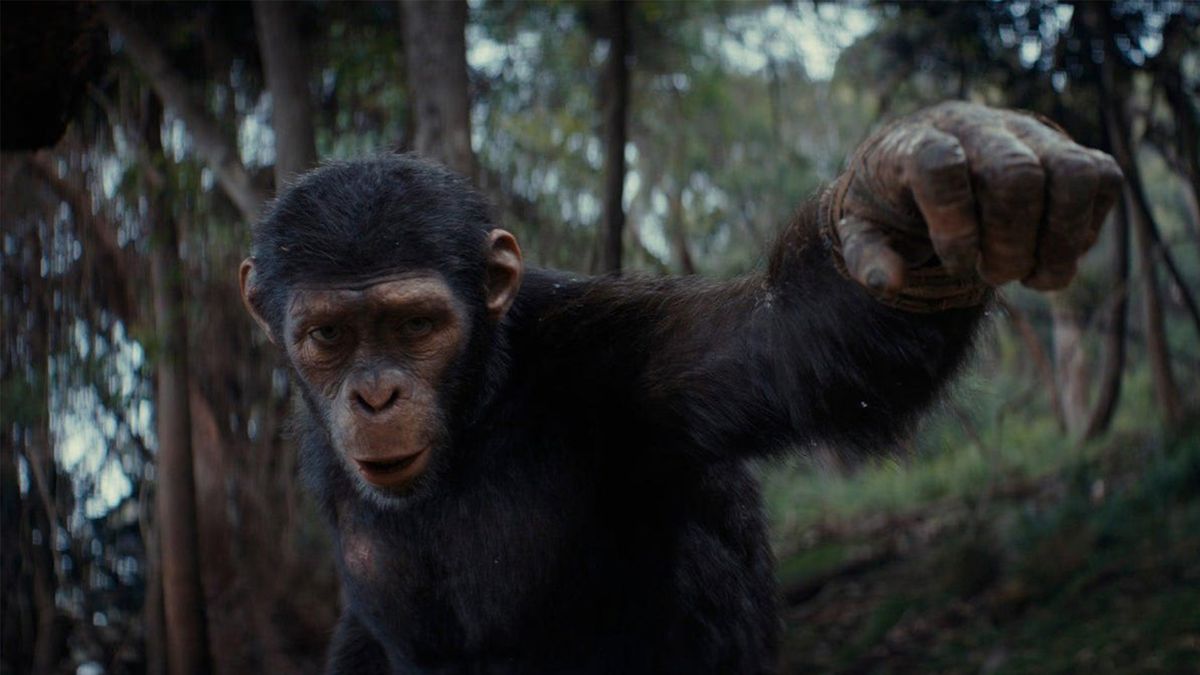Early in Kingdom of the Planet of the Apes, Wes Ball's sequel/soft reboot of the Planet of the Apes franchise, protagonist Noa (Owen Teague) speaks to his father Koro (Neil Sandilands), the chieftain of his tribe. The conversation is terse, full of the classic "first act conversation between doomed parent and protagonist child" tropes, but in the end, Koro softens somewhat. Smiling sadly, he looks to his son and simply says, "Much to learn." After a hesitation, he adds, "Much to teach." This conversation, strangely, is an indicator of the film as a whole. Like Noa, Kingdom is a scrappy thing, living in the shadow of predecessors, but the potential for greatness is unquestionably there.
The smartest move for the franchise was, unsurprisingly, the decision to timeskip 300 years into the future. This allows the audience to explore the overgrown ruins of the old world, giving it a far more fantastical, mythic feel as our protagonists explore crumbled cities and ponder what came before. The film's script, penned by upcoming Avatar 3 scribe Josh Friedman, delves into this as well, deliberately keeping details of the previous films vague, allowing them to fade into an almost mythic reverence, while its story resembles epic fantasy stories like Conan the Barbarian rather than the grim-faced war thrillers of War and Dawn or the sci-fi spectacle of Rise. For much of the film's runtime, it's similarly content to go for more simplistic ideas; at its heart, it's a road movie that slowly reintroduces us to the world. While this does make some of the film's bigger ideas feel undercooked, I suspect it may stand stronger once it's part of a completed trilogy.
The direction, similarly, veers into a different direction, using the unsurprisingly excellent visual effects for some very confident direction. Ball wears his influences on his sleeve, and you can see everything from Avatar to the aforementioned Conan to the Last of Us in the various setpieces and the general visual tone of the world. While it's not as striking as Reeves's entries in the series, going for a brighter palette, there's some truly stunning stuff here. Ball expertly shoots things like a fiery attack on Noa's village by slavers or a tense climb through a flooding facility, ratcheting up tension and keeping focus throughout the increasing chaos. Kingdom is a big, bombastic adventure movie, and there's a lot of fun to be had there.
No one understands that assignment quite like Kevin Durand, a genuine show-stealer as wannabe king Proximus Caesar. A swaggering tyrant who, in probably the film's most insightful commentary, takes the late Caesar's name and ideals, twisting them for his own use, Proximus is a dominant, genuinely charismatic figure. Durand plays him with confidence, using his body language to always feel like the largest person in the room as he preaches his gospel. With every word, you can see him try to plant the seed of doubt in Noa's mind—his mistrust of humans not without a grain of truth. The cast, given the difficult role of motion capture, all do a great job, but Proximus especially feels like a living, breathing character, intimidating and giving just enough depth to feel like a proper villain.
While Kingdom isn't perfect, suffering from some late-game twists that feel a tad jarring and could potentially feel like a retread if misused, it's hard to deny it's magic. The Apes movies are truly special as blockbusters, emotionally rich, and visually striking in their own unique fashion, and I'm happy to see that this is a worthy successor. In the first of three, the potential is there. They only have to grow it properly.


No comments:
Post a Comment